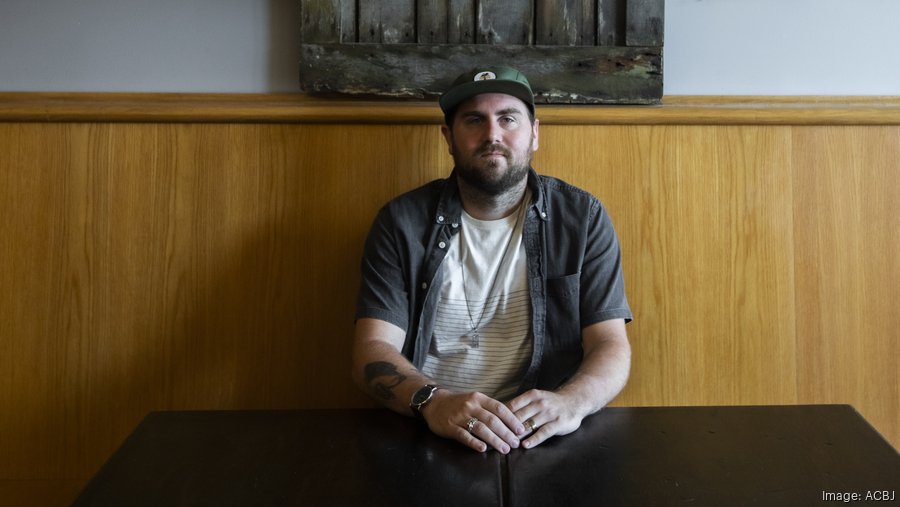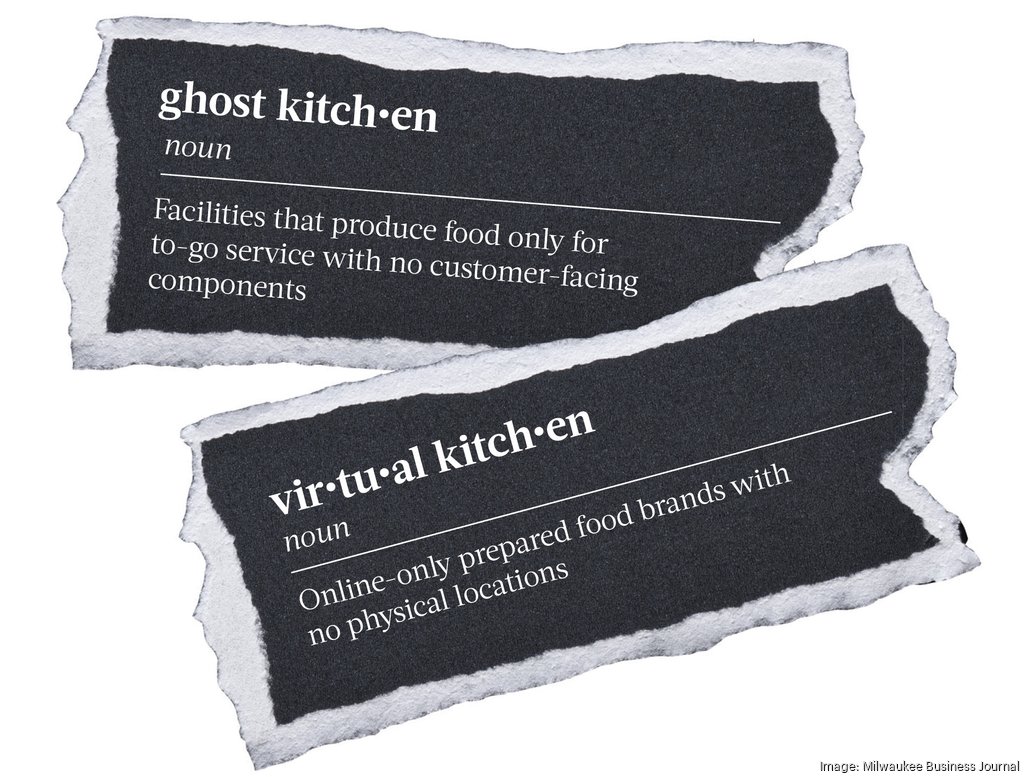
They’re here, but you can’t always see them.
The concept is known by different names: Virtual restaurant, delivery-only restaurant, cloud restaurant – the list goes on. Many say “ghost kitchen,” although some in the industry argue that term is more specific to the real estate than to the food preparation.
Whatever the terminology, the attributes are generally the same: These businesses do not have a customer-facing physical operation. Similar to e-commerce, orders typically are placed online, and either an internal or third party delivers the product to the end user. In many cases, customers have no face-to-face interaction with the restaurant and may not even know where it is.
Delivery-only brands already were springing up before the Covid-19 pandemic, mainly in coastal communities. In the early days of the coronavirus outbreak, nearly every restaurant in Wisconsin was forced to take on some of the main characteristics of a virtual kitchen.
Dining rooms were ordered shut, and restaurants could operate only for to-go service. Often, these were not true cloud restaurants: orders may have been placed over the phone, and customers may have collected their purchases curbside.
Regardless, the pandemic forced restaurants to rely on off-premise sales to continue driving revenue.
The shift was evident in delivery companies’ financial performance. Citing regulatory filings, MarketWatch reported last year that the four top third-party delivery platforms collectively saw their revenue climb $3 billion in the second and third quarters of 2020.
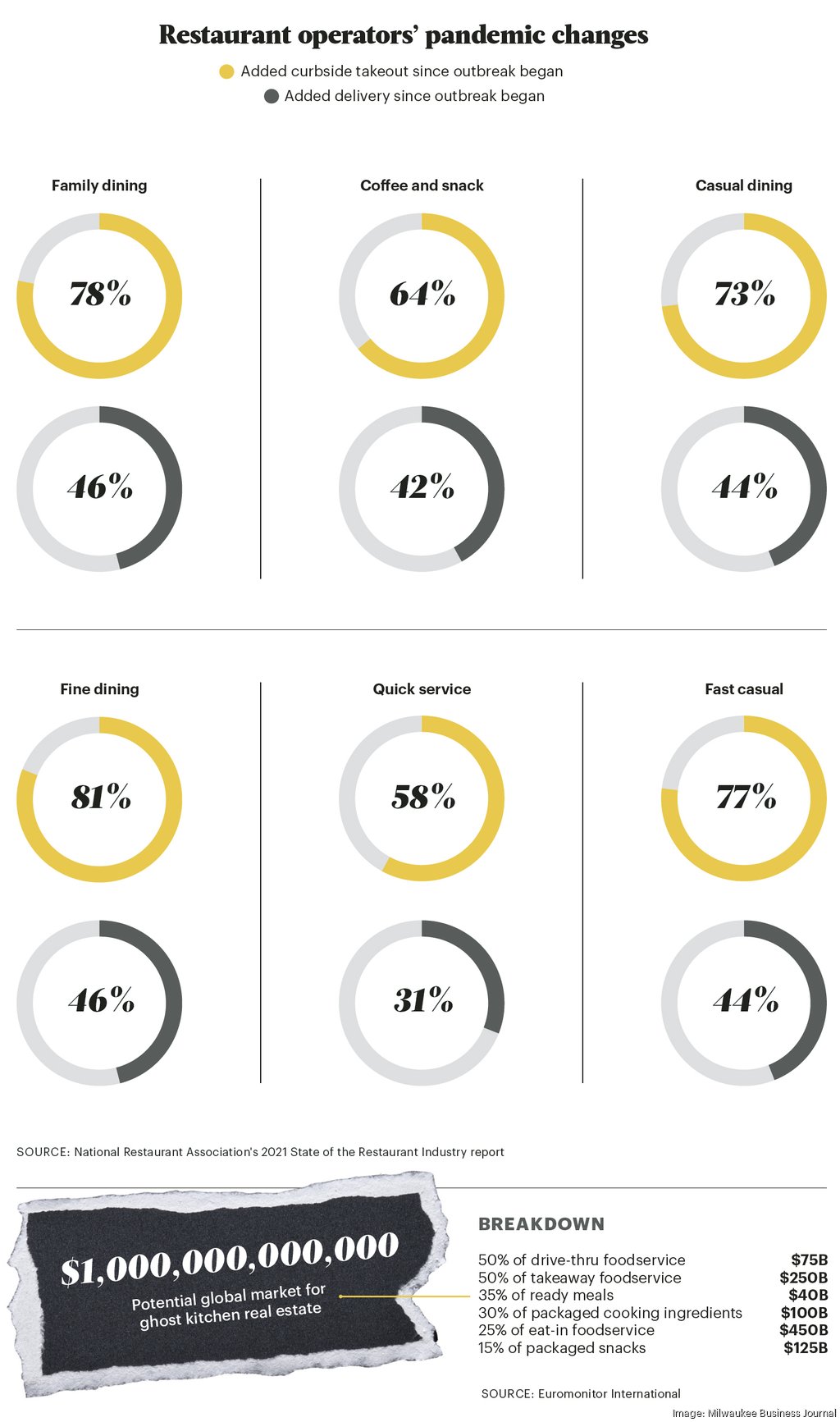
For some in the Milwaukee area, the coronavirus crisis led to menu and brand innovation, including delivery-only concepts.
Those virtual kitchens have taken different forms. For example, celebrity chef Guy Fieri’s Flavortown Kitchen, a delivery-only brand, has a Brookfield presence. Flavortown typically operates from existing restaurants’ kitchens, such as Buca di Beppo, according to a report from Eater.
Other virtual brands took advantage of under-utilized space while pandemic restrictions were in place. The Milwaukee Bucks, for instance, launched an online-only brand called Cream City Cluckery, which sells chicken tenders and house-made sauces.
Initially, Cream City Cluckery operated out of the kitchen at The MECCA Sports Bar and Grill, a restaurant in the Deer District. Eventually, the operation moved into a larger kitchen inside Fiserv Forum that was not being used.
Still others are spinoff brands by chefs or restaurateurs using their own kitchens to drive additional revenue.
Not only have delivery-focused concepts provided a lifeline during the pandemic, the business model carries innate financial perks. Virtual restaurants don’t have to invest in décor or furniture. They don’t need as many employees. They require less real estate. For a start-up, they’re a chance to test menus and work out kinks.
But cloud kitchens have not been without controversy. According to Restaurant Dive, the rise of ghost kitchens moved municipal officials in some cities to consider regulations on ghost kitchens to prevent them from disrupting the vitality of local restaurant scenes.
Hakan Hare, a retail specialist with Founders 3 Real Estate Services, said he expects ghost kitchens will continue popping up in Milwaukee for the same reason the community has seen growth in the food hall model: shared real estate.
From the consumer perspective, Hare said the reliance on e-commerce during the pandemic means customers are also more accustomed to ordering their food online. Regardless of the future for delivery-only concepts specifically, Hare said he expects restaurants will scale back their footprints and lean more heavily into off-premise sales.
Nationally and globally, industry analysts are monitoring the shifts in consumer habits and restaurateurs’ business models. Euromonitor International, a market research firm based in the United Kingdom, estimates the evolution of delivery could make ghost kitchen facilities a $1 trillion global market by 2030.
That’s based on an expectation that delivery will become faster, cheaper and more reliable, said Euromonitor’s Michael Schaefer. His estimate accounts for demand for a variety of food services, including ready meals and packaged cooking ingredients.
“As prices go down and you start to estimate more and more of this traffic moving towards delivery, then you start to get some very large numbers just on the basis of the overall size of this market,” he said during a 2020 presentation.
Here in the Milwaukee market, where the concept appears to be in an early phase and restaurants are seeing guests return, the question remains: Were cloud kitchens a pandemic solution for Milwaukee restaurants, or are they here to stay?
The Milwaukee Business Journal interviewed participants in this industry segment about their experiences. Their stories follow.
Common Cookhouse
Address: 924 E. Rawson Ave., Oak Creek
Description: Common Cookhouse is a rentable kitchen space used by food businesses, such as food trucks and to-go only restaurants.
Common Cookhouse started as a personal solution.
Cathy Sederberg, the owner and president of the Oak Creek business, wanted to help her daughter, who was looking for a reliable base kitchen for the food truck she wanted to start. Sederberg said her market research uncovered another potential revenue stream.
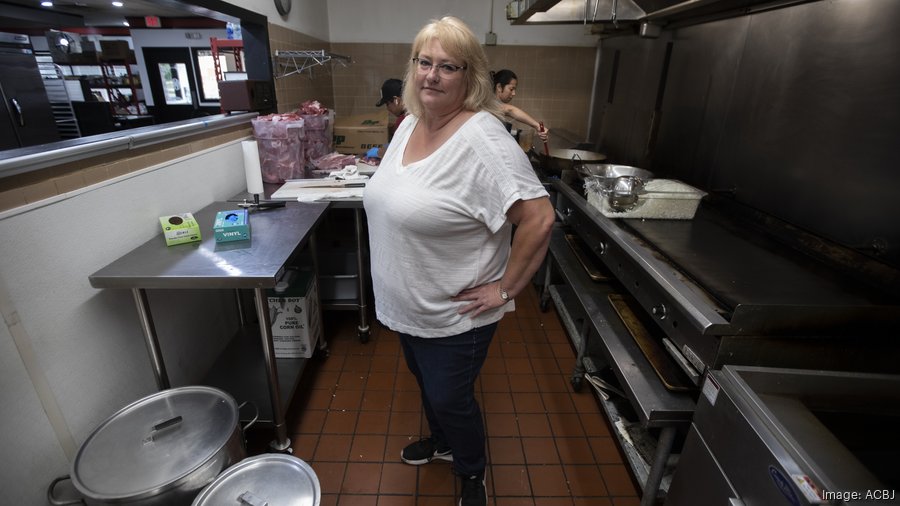
“We realized that the ghost kitchen concept was really something that was going to be taking off in the coming years,” Sederberg said.
With that opportunity in mind, Sederberg said she sought a space that could serve the needs of a variety of food makers.
Common Cookhouse opened last September at 924 E. Rawson Ave. with about 3,000 square feet of space. Among its clients are food trucks, a chef making prepared meals and a business with some traits of a virtual restaurant.
Sederberg said she sees opportunity in the world of cloud restaurants as attitudes toward brick-and-mortar restaurants evolve and the franchise model grows.
“I do see ghost kitchens becoming something that, in the next probably three to five years, is going to be very prevalent, especially with big names throwing their name behind projects,” she said.
Sederberg said she expects the model to grow through different avenues because all of a virtual restaurant’s work is behind the scenes. Examples include chefs creating a menu that others buy into as a franchise, as well as existing restaurants creating to-go only operations.
“The public doesn’t really care. …They just want that end result – the food product – at their home when they order,” she said.
Dairyland
Address: 924 E. Rawson Ave., Oak Creek (to-go only); 636 S. Sixth St., Milwaukee (food truck)
Description: Burger business Dairyland began as a pick-up only restaurant. The concept will be a vendor at the 3rd Street Market Hall development.
When the partners in Dairyland decided to launch their concept, they opted to start with a test.
Dairyland will be a tenant at the 3rd Street Market Hall in downtown Milwaukee, which is expected to open this year. When the opening was still some time away, Dairyland co-owner Kurt Fogle said he and his partners decided to start selling the brand’s food with a model akin to a virtual restaurant.
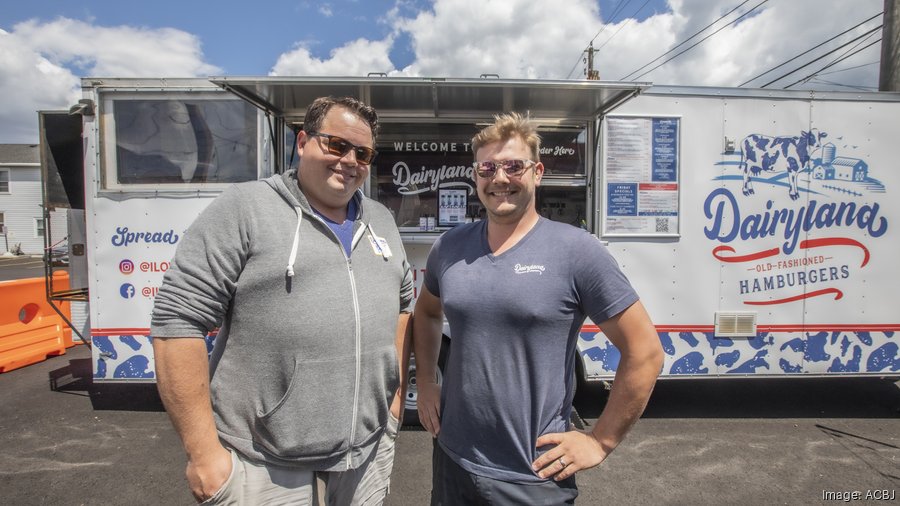
The burger business leased space from Sederberg’s Common Cookhouse in Oak Creek and sold its food only for curbside pick up. The to-go-only model served two purposes, Fogle said. For one, it gave Dairyland a base kitchen for its food truck at Milwaukee’s Zócalo food truck park. In addition, Dairyland had an opportunity to begin developing the brand.
Co-owner Joe McCormick said the partners learned the virtual business model is not easy for all customers, such as those less savvy with technology.
“For someone that’s more used to going to a restaurant, to go to a counter and order and have someone take their order, it’s a really flabbergasting concept,” he said.
The business has taken some orders by phone, akin to a traditional restaurant, to better serve those customers, he said.
Dairyland’s virtual concept is not expected to continue after the food hall opens, although Fogle said the business may do pop-ups to serve Oak Creek customers. As for the segment as a whole, Fogle said he likes seeing the model support local entrepreneurs but is not a fan of national brands penetrating the market through ghost franchises.
McCormick said he expects delivery-only restaurants will have a more significant presence in markets larger than Milwaukee.
“The cost of operating and the cost to rent in Milwaukee is still relatively manageable,” he said.
Crafty Cow (Et Al.)
Addresses: Crafty Cow/Big Wings/Fiesta Panda: 2675 S. Kinnickinnic Ave., Milwaukee; Crafty Cow/Down South Sammies: 153 E. Wisconsin Ave., Oconomowoc
About: Burger restaurant Crafty Cow has locations in Oconomowoc and Milwaukee. During the pandemic, the owners started virtual restaurant brands to generate more revenue.
Devin Eichler couldn’t sleep when the pandemic shut down his Crafty Cow restaurants in Oconomowoc and Milwaukee.
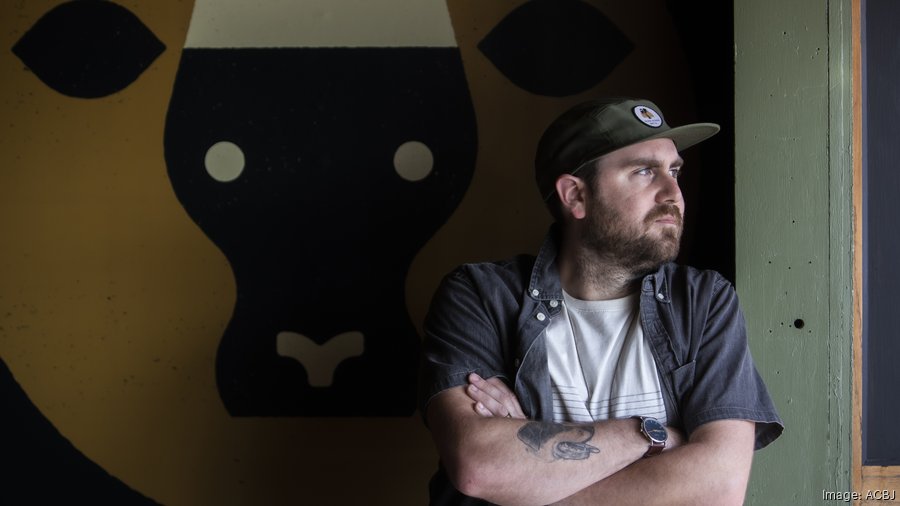
But then he had an idea. One day at 3 a.m., Eichler said, he awoke his wife to tell her he figured out how to save the restaurants.
“We’re going to open three brand new restaurants tomorrow,” Eichler recalled telling her.
By that, he meant Crafty Cow would use its existing kitchen space to try a concept he’d read was taking place on the West Coast. Eichler saw virtual restaurants as a chance to expand Crafty Cow’s offerings and test new ideas.
The local burger restaurants are now home to three virtual brands. Big Wings sells chicken wings, as well as cauliflower “wings” for those who do not eat meat. Down South Sammies is a sandwich concept, and Fiesta Panda is a Mexican, Asian and American fusion brand.
Introducing new brands when dining rooms across the region and state were closed gave customers something to be excited about, Eichler said. On the back end, he said the business model created some confusion among third-party delivery drivers who didn’t realize how many brands were operating out of buildings labeled Crafty Cow.
When the business introduced its virtual concepts, Eichler said, the restaurants were busier than ever. Traffic has slowed now that customers are returning to dine on-site, he said, but the delivery-only concepts continue to generate revenue.
“We’re still moving through them pretty regularly,” Eichler said. “We don’t plan on having them go away any time soon.”
He said he is interested to see what role the cloud restaurants will play in the winter, when foot traffic slows.
Smokin’ Jack’s
Address: W229 N1400 Westwood Drive, Pewaukee
Description: Smokin’ Jack’s is a carry-out-focused concept that
After years in the restaurant industry, Jack Holt was ready to start his own business.
He decided on a barbecue concept, because his family is fond of smoked meat. He started Smokin' Jack's Bar-B-Que & Grill, which operates out of Point Burger Bar in Pewaukee.
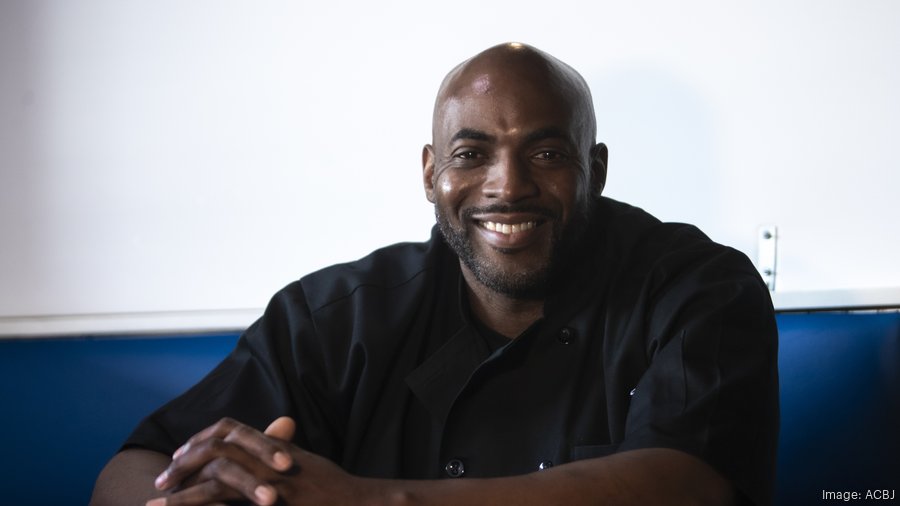
Holt said he learned of to-go-only concepts from chefs on the West Coast and saw the concept gaining steam as celebrities participated.
“Covid and the rise of third-party delivery services really catapulted this to become a serious player within the hospitality industry,” Holt said.
Smokin’ Jack’s has seen enough sales that Holt said he is in the process of developing two brick-and-mortar locations for the concept. One is expected toward downtown Milwaukee, and the other is planned in lake country. The restaurants will be casual with a full bar, he said.
Holt also is growing the brand with new products. He is expanding into meal preparation and also will serve tacos under the Smokin’ Jack’s brand.
Since launching Smokin’ Jack’s, he said, others have approached him about placing a virtual restaurant in their spaces. Holt said he has not yet explored a franchising model for his business. Still, he said those interactions demonstrate an underdeveloped opportunity for hospitality in Wisconsin “if you really have the right team and right product.”
Although he is scaling the brand out of a virtual model, Holt said he believes delivery-only will be part of hospitality’s future.
“If you’re looking at opening a new concept, instead of filling right into a brick-and-mortar, you perfect your concept, the recipes, the execution of recipes in real time, before you enter into a lease or enter into a do-or-die situation,” Holt said.
Meat & Co.
Ben Crevensten’s business plan didn’t initially contemplate a delivery-only restaurant.
When he and a business partner, who is unnamed at this time, developed a vision for Meat & Co., their full concept included an upscale deli and cocktail lounge.
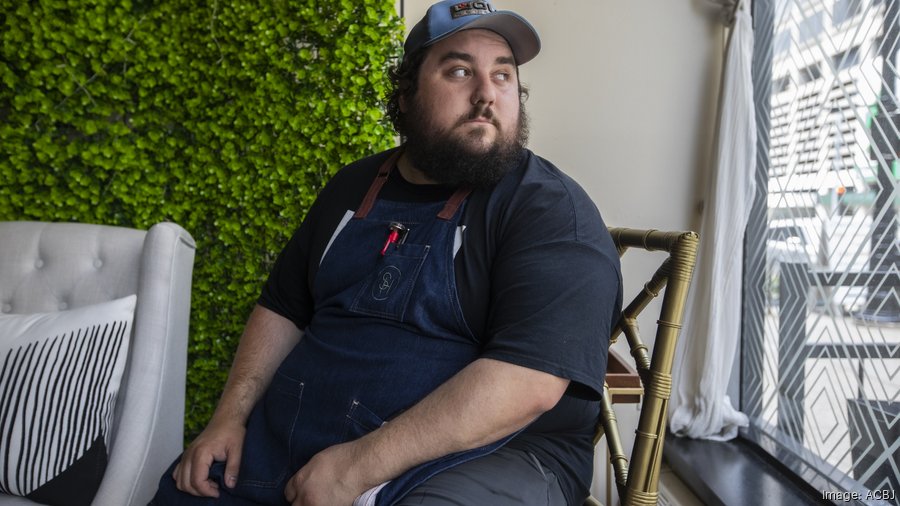
To start, though, Crevensten and his partner wanted to open a food truck. The mobile business would allow Meat & Co. to start building a brand for its modern sandwich shop. As a base for the food truck, Crevensten secured kitchen access at Milwaukee event venue The Box. He saw an opportunity to generate additional revenue as a virtual restaurant – if The Box was open to it.
“It went from just a prep kitchen to one with to-go sales,” he said. “They’re willing to do more with us than most places, because they’re an event space. It fits well into the food scene.”
Crevensten said the hunt for a food truck did not pan out as planned, and an opportunity for a brick-and-mortar operation came along unexpectedly.
Meat & Co. will still serve its sandwiches in a to-go-only format from The Box.
Crevensten said he’s unsure of the longevity for virtual kitchens in Milwaukee, but he does believe some of the habits that emerged during the pandemic will remain.
“Forcing people to do to-go food created a better situation for the to-go food world,” he said. “I think it caused people to change their techniques in the way that to-go food happens. They’re not just slopping food in a box. They’re thinking of ways to creatively package things.”
As in-house dining rebounds, Crevensten said he hopes to see some of the conditions that better-enabled to-go service stay in place, such as the carry-out zones Milwaukee allowed restaurants to establish.
Cousins Subs
Local sandwich shop chain Cousins Subs was early to the delivery-only model, and the company is ending its experiment.
Menomonee Falls-based Cousins Subs announced in the summer of 2019 it would open a delivery-only restaurant to serve downtown Milwaukee. Some franchise locations in the city closed after contracts expired, and Cousins wanted to find different spaces to maintain its presence in the market.
Justin McCoy, the company’s vice president of marketing, said Cousins had been looking for traditional brick-and-mortar real estate around Fiserv Forum and the Milwaukee Bucks’ development. When the sandwich business did not find what it sought, Cousins pivoted and considered a commissary kitchen-style setup.
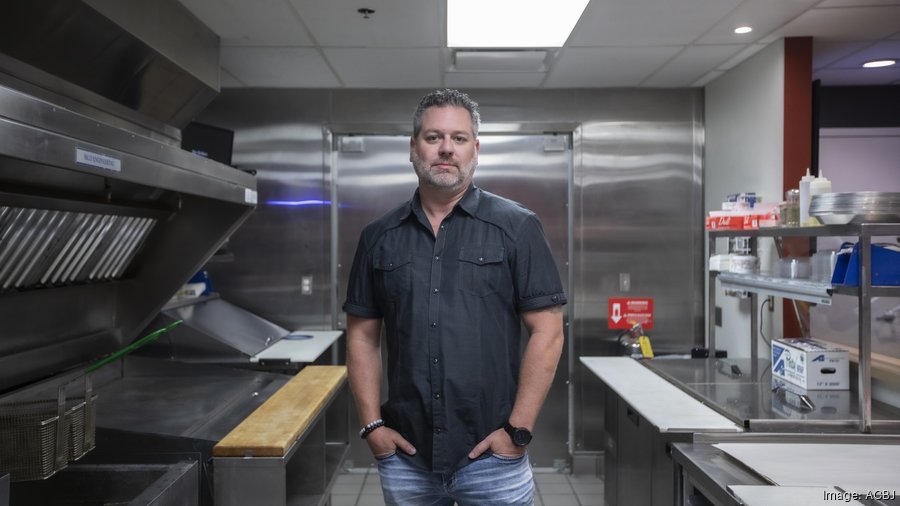
Testing a virtual restaurant model had another benefit, McCoy said.
“We are looking to grow outside the state of Wisconsin,” he said. “As we do look to go into larger cities, we wanted to see if this might be something that makes sense for us.”
In addition, the warehouse gave Cousins downtown parking for its food trucks.
Although delivery was important to the chain’s financial performance throughout the pandemic, the lack of office workers downtown hampered sales for the delivery-only test, McCoy said. The commissary kitchen did not take off the way residential delivery did, and Cousins is adding a small storefront to the building.
The new restaurant will have limited seating and is intended predominantly to fill pickup orders, McCoy said. Cousins aims to open the restaurant in time for Summerfest in September.
McCoy said the addition of a storefront could help raise awareness of Cousins as a food option downtown because of the added brand visibility.
Virtual restaurants are not a dead concept for Cousins, McCoy said, but the company is unsure of the concept's future after the pandemic hindered the trial in Milwaukee.
